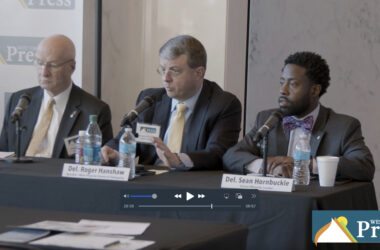
Holocaust survivor Rubin Sztajer, 88, a retired history teacher from Timonium, Md., shares his personal experiences of growing up and surviving the Holocaust with Spring Mills High School and Middle School students Wednesday afternoon. Behind him are photos of his family and life in the ghetto and the concentration camp.
SPRING MILLS, W.Va. – Right from the beginning, Holocaust survivor Rubin Sztajer connected with his young audience.
Spring Mills Middle School eighth-graders and Spring Mills High School ninth-graders didn’t move – or make a sound – as Sztajer, now 88 years old, described losing his teen years to German Nazis when they invaded Poland and began to systematically target Jews for elimination.
Ironically many of the students in the audience were about Sztajer’s age when he was being oppressed simply due to his religion.
At that time, he was literally ripped from his mother’s arms on April 12, 1942 – never to see her and other family members again – as a result of being sent to a series of six concentration camps, each worse than the previous one.
Sick and malnourished, Sztajer was nearly dead when he was liberated. He’d been beaten, forced to drag dead bodies to mass burial pits and traveled in human waste during the time he’d been a prisoner.
There was one bright spot, however, during his imprisonment.
“One day, I heard my name and saw a familiar face – it was my older sister. I couldn’t go to her and she couldn’t come to me, but I knew she was there. I knew she did survive,” Sztajer said, adding that this same sister had later been his “savior” because she’d been responsible for saving his life as the war was ending.
Throughout his presentation, however, Sztajer, always managed to remain positive about life – and how much can be accomplished despite great difficulties.
Recalling when he arrived in the United States, Sztajer had no family, money, job or home and didn’t speak English. But he persevered, got married and today is “comfortably retired” from a sales career. He and his wife live in Timonium, Maryland, have three children as well as seven grandchildren – all of whom are well educated.
“You have great opportunities to eventually be where I am today. I know you can do it. I know you will do it,” Sztajer said.
Recalling how he’d cried his first night away from home, Sztajer said he still sheds tears for lost family members, including his mother, father and three siblings.
It hurts to wonder how things would be with them today, but there will never be any answers, Sztajer said, tears welling up in his eyes.
Clearly speaking from his heart, Sztajer urged the students to give voice to their feelings.
“It will take a little courage, but go tell your parents and siblings how lucky you are to have them. I can’t do that, but you can. And you are going to make some people very, very happy,” he said, pausing as audience members gave him a standing ovation.
After he finished speaking, students began asking questions-whether he’d ever gone back to his hometown, how he feels about Germans now, if there is still discrimination against Jews today.
At first, only one or two students stood up at the seats to address him.
But that changed as a stream of young people made their way to the front of the Spring Mills High auditorium…






